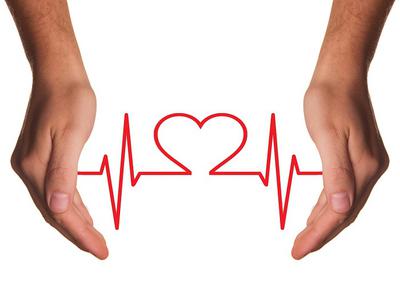The Effect Of Weight Loss On Heart Health
Being overweight can result in an increased risk of heart disease. In order to know if you are overweight, you need to check your body mass index or BMI.
This can be done using a BMI calculator on the internet or by calculating it yourself, which means taking your weight in pounds and dividing it by your height in inches squared.
You then multiply that number by 703 to get your body mass index.
A body mass index of between 18 and 25 is considered normal. A body mass index of 25 to 30 means you are overweight and a body mass index of above 30 means you are obese.
If you are overweight or obese, you need to do what you can to get your BMI values into the normal range. It means getting in shape through regular exercise and eating foods that are lower in calories and fat.
You don’t have to lose a ton of weight in order to lessen your risk of heart attacks and strokes.
A weight loss of just 5 to 10% will greatly lessen your risk of the various types of heart disease, including stroke, heart attacks, or peripheral vascular disease.
The Results of a Recent Study
Researchers who published a study in the New England Journal of Medicine found that when you reduce the number of calories you take in, the actual type of diet you choose isn’t as important.
It means you can eat a low fat diet, a low carb diet, or a high protein diet, as long as the total calorie count is below that which sustains your weight.
An average person needs between 2000 and 2500 calories per day to sustain their weight.
If you can reduce the number of calories you take in per day to 500 calories less than your baseline, you can lose up to a pound of body weight per day, regardless of where you choose to reduce those calories.
It isn’t as much about a specific balance of carbs, protein, or fat but depends on the total caloric count per day. Also, keep in mind that if you become very physically active you can actually eat more calories daily and still lose weight.
Weight Statistics
According to the organization that takes measurements of our health (the Centers for Disease Control and Prevention or the CDC) about 66% of adults in the US are considered to be overweight while as many as 1/3 of us are to be considered obese.
If you fall into either of these categories, you will be able to lose weight through calorie reduction and will not become one of the statistics at risk for heart disease.
The Role of Exercise
Besides decreasing your calorie count by 500 calories per day, you can increase your level of exercise.
You can do this by running, brisk walking, cycling, swimming, or any other activity you enjoy that raises your heart rate and respiratory rate.
This is called aerobic exercise and should be done about thirty minutes a day 3 to 4 times per week.
On the other days of the week, you can do anaerobic exercise, which means lifting weights or using specialized weight machine.
Anaerobic exercise can increase your muscle mass, which makes it easier to lose weight because your basal metabolic rate will be higher allowing you to burn more fat even when at rest.
Between aerobic exercise and anaerobic exercise, you will be exercising thirty minutes a day every day of the week. It’s just thirty minutes and won’t take up too much time for the benefit it gives you.
How Does The Heart Respond To Weight Loss?
If you lose just ten percent of your body weight (which is twenty pounds for those who weigh 200 pounds already), your heart will respond accordingly and these things will happen:
• Your blood vessels will be more elastic. The blood vessels will be less narrow and will be more elastic when you exercise. This reduces the workload on your heart and will take the stress away so your heart can function more effectively. There will be less fat in your arteries, which collects on the lining of blood vessels, forming plaques that narrow the arteries and can increase the chances that a blood clot will close off the arteries, causing strokes, peripheral vascular disease, and heart attacks.
• Your blood pressure will be lower. There is a direct connection between your weight and blood pressure. The lower your weight, the lower is the risk of developing hypertension, which can lead to heart disease. Exercise also lowers blood pressure, which is another reason to include exercise as part of your weight loss program. You can also take medications for hypertension that might need to be reduced if you can successfully lose some weight.
• Your blood lipids will be lower. The amount of lipids in your blood will be lower when you lose weight. Losing weight can decrease your triglyceride level, can raise your HDL cholesterol (the good cholesterol), and can lower your LDL cholesterol (the bad cholesterol. All of these changes will improve your heart health.
• Blood clots will diminish. If you lose weight, it is less likely that you will develop blood clots, which means that your chances of having a blood clot close off an artery will decrease and the chance that a blood clot in your leg could break off, resulting in it travelling to your lungs, brain, and heart.
• Your belly fat will go down. It turns out that the amount of fat you retain around your belly greatly increases the risk of heart disease. In a study out of the journal, Cardiology showed that belly fat could contribute to heart disease, even in people who are otherwise of a normal weight. Weight loss around the belly can reduce your risk of developing this complication.
Learn more here in my section explaining all about how to lose 5 pounds in a week
Losing weight isn't hard you just need to make a few lifestyle adjustments.
These changes are minimal but can add up to a huge difference when you are trying to lose weight.
Following the detailed information in this book will help you step by step to achieve your weight loss goals, on a healthy diet, that is safe to follow, and is based only on natural nutrition - no drugs, no processed / packaged meals or strange foods you hate!
Get a preview of it here at Amazon.... but you can also get it at Lulu, and iTunes as well
Just click on the cover or link to see the previews online:

7 Ways in 7 Days to Lose 5 Pounds
One of the other very healthy diet books I have published looks at ways that eating raw food only can improve your health while managing your weight.
You can learn more here in the website guide for How to Start Raw Food Diet Plan
or go direct to the book previews on amazon by clicking the link or book cover below:

The Raw Food Diet Made Simple - Transitioning to a Raw Food Plan for Better Health, Vibrant Energy, and Weight Loss
Join in and write your own page! It's easy to do. How? Simply click here to return to Weight Loss.

"Power Tips" magazine is back!
You Get A Free Complete Self Help Report delivered to your email box every edition, plus you get a free PLR article and other great gifts!
SUBSCRIBE BELOW ... I promise you will want to USE what you learn!
I really want to know what you think of this site, this page, and to hear your tips or suggestions about it.
So please share your story or simply add a Comment in the comment box.
If you feel that the information on this page has been useful to you please give it a Like or share it with your friends - thanks!!
"You are a life Saver!!
I recently discovered this site and I can tell you that my life has not been the same. I now come here EVERYDAY and spend at least 1 hour.
I used to spend that time browsing online fashion and beauty
magazine which just means that I spend more. Now I have replaced that
habit with coming here.
In future I will think about contributing articles as well. Thank you! Thank you!! Thank you!!! and God bless"
Contact Us | About Us | Terms of Use | Privacy Policy | FAQ | Testimonials
Amazon and the Amazon logo are trademarks of Amazon.com, Inc. or its affiliates. As an Amazon Associate I earn from qualifying purchases. Product prices and availability are accurate as of the date/time
indicated and are subject to change. Any price and availability
information displayed on [relevant Amazon Site(s), as applicable] at the
time of purchase will apply to the purchase of this product.









